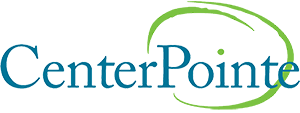At CenterPointe, we strive to provide the highest quality care available in the community. This means that we aim to “Be the Best” provider of care, and work hard to not only meet, but also exceed, and ultimately set the standards for care. There are five central pillars of the CenterPointe Model of Care:
Pillar I: Bio-Psycho-Social Model of Integrated Care
- Bio-Psycho-Social Model: We provide care that treats the physical, behavioral, and environmental needs of the person served. By treating the whole person, we are able to help people get better, sooner, for longer.
- Integrated Teams Model: We take pride in the interdisciplinary team model in our program, and value the voice of every professional and the individual in service.
Pillar II: Low-Barrier, High-Access Availability and Individualized Goals/Outcomes
- Low-Barrier, High-Access Availability: We prioritize getting the person to safe, stable, supportive, permanent, and affordable housing whenever possible, and removing all systemic barriers possible in order to accomplish this.
- Individualized Goals/Outcomes: We strive to “meet the person where they are at, but we don’t leave them there” and believe in the idea that “better is better.” We do not push goals onto people that they do not want for themselves.
Pillar III: Philosophy of Strength-Based, Trauma-Informed & Person-Centered Care
- Strength-Based Care: We focus on people’s strengths, needs, abilities, and preferences for their life and recovery, rather than on people’s deficits, diagnoses, labels, or problems.
- Trauma-Informed Care: We assume that everyone, including team members and each individual in service, has experienced trauma. We actively work to recognize trauma and take active steps to avoid retraumatizing individuals.
- Person-Centered Care: We treat people as unique individuals. We use strength-based language, personalize Recovery Plans to the needs of the individual, and customize the care we provide in every interaction we have.
Pillar IV: Using Evidence-Based Practices
- Zero Suicide Framework (ZS): A systems framework wherein every individual is screened for suicide risk, those with identified risk are assessed and provided with suicide-specific care, called our “Life Worth Living Pathway.”
- Medication for Addiction Treatment (MAT): The use of FDA-approved medications to treat substance use disorders and support sustained recovery.
- Motivational Interviewing (MI): A set of communication techniques that are designed to help people engage in a change process.
- Cognitive-Behavioral Therapy (CBT): A set of techniques that focus on helping people identify their irrational beliefs that are leading to emotional discomfort and behavioral problems.
- Dialectical-Behavioral Therapy (DBT): A set of techniques that helps people change maladaptive behaviors and learn new skills, focused on mindfulness, emotional regulation, interpersonal effectiveness, and distress tolerance.
- Contingency Management (CM): A set of behavioral techniques that reward specific, pre-identified behaviors (such as attendance, participation, and engagement in a program) with a reward that has monetary value.
- Eye Movement Desensitization and Reprocessing (EMDR): A structured therapy that helps individuals process and resolve traumatic memories by using bilateral stimulation.
- Collaborative and Concurrent Documentation: The practice of documenting the relevant information, interventions, responses, and plan during the session with the individual, in order to improve rapport.
Pillar V: Making Data-Informed Decisions
- Daily Living Activities (DLA-20): A clinical assessment tool that we do in all of our behavioral health programs that focusing on whether or not the person’s functioning is improving in their day-to-day life.
- CenterPointe Metrics: We have identified specific metrics that are evaluated overall as an agency and within each program, focused on: utilization, compliance, satisfaction, health & safety, outcomes, and employee engagement.
- Continuous Quality Improvement (CQI): We utilize real-time reporting tools inside of our electronic-health record and program-level committees to inform our CQI approach to providing better care.
- Lean Six Sigma: A data-driven methodology that combines Lean principles and Six Sigma tools to reduce waste, eliminate variation, and improve efficiency and quality in organizational processes.

